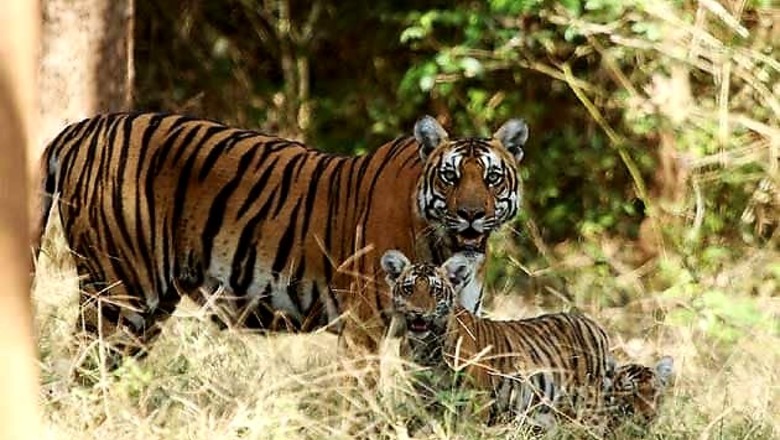
views
Bengaluru: Tiger numbers may have increased over 25 per cent, from 1740 to 2286, in the Indian forest landscape. But let us not get excited. There are too many loopholes that dog our conservation policies, detrimental to the future of our flagship species.
The problem is at three levels. It begins with our 'learned' Environment Minister Prakash Javadekar, percolates to the unholy goings-on in the Forest Department and the fight between fund-hungry, headlines seeking NGOs.
Without understanding the dynamics of forest and wildlife conservation, an excited Mr Javadekar went to the extent of saying "India is even willing to donate tiger cubs to the international community and play a key role in global tiger conservation efforts". Wonder if he knows that India was home to one lakh tigers when the British ruled us.
He should be given the 'Padmashree' for this blah-blah. He would do well to increase the area of tiger habitats, instead of giving over-the-counter clearances for mining, hydro and infrastructure projects in forests. Economic empowerment through development is welcome, but not at the cost of our forest landscape, which is our only lung-space.
Mr Javadekar should understand that every citizen is a stake holder. He can't destroy God's Gift to mankind: Forests and wildlife. If he means what he says (gifting tiger cubs), let him increase the size of our natural forests, instead of shrinking and fragmenting it to please mining, oil, hydro and infrastructure tycoons.
Let's talk about our NGOs. Some are a bane to our wildlife. Take the instance of the on-going rift between noted wildlife biologists Ullas Karanth and Sanjay Gubbi. Karanth had no issues with Gubbi as long as he worked in his Centre for Wildlife Studies (CWS) Empire. Both were on the same page when it came to wildlife conservation issues.
But they have turned bitter rivals. Why: Gubbi moved to the more reputed Nature Conservation Society (NCF). Conservation has suffered in their battle for wildlife turf. Karanth many believe has turned nasty. Two incidents bring his angst against Gubbi to light.
First: When a radio-collared leopard was found dead in the vicinity of Mysore, a picture of the feline hanging from a tree was mysteriously released to a select group of journalists. It was alleged that the leopard had died due to asphyxiation caused by the radio collar.
When post mortem reports revealed that the leopard had died of poisoning (zinc phosphide), the forest department issued a statement that someone with malicious intentions was creating trouble. Intriguingly, 30 RTIs had been filed to pin down Gubbi, who had been given the go-ahead for radio-collaring leopards that come into conflict with humans.
Second: When a radio-collared tiger, which had killed a woman in Chikamagalur coffee estate, was released in Bhimgad wildlife sanctuary near Khanapur (Belgaum), Karanth again accused Gubbi. He went on to suggest that Gubbi was ill-experienced in radio-collaring. He even went to the extent of asking for a government enquiry. Yes, Gubbi failed in his endeavour. The tiger killed another woman before it was shot dead.
Karanth should also take responsibility for killing some of our tigers and leopards when he was learning the nuances of radio-telemetry. His utterances, in his quest to tarnish Gubbi's image, has impacted wildlife conservation. Vinay Luthra, chief wildlife warden of Karnataka, says it was the tiger (wildlife) that suffered in the battle between two wildlife biologists.
Let's hope Karanth and Gubbi bury their differences for wildlife sake. Unless all of us work in tandem, no conservation program will be successful, more so when Javadekar is hell bent on clearing mining and infrastructure projects. Unlike conservationists, Javadekar's interest is dollars, not tigers.
(Joseph Hoover is a well-known wildlife expert and photographer. He is also a member of Karnataka Wildlife Board)



















Comments
0 comment